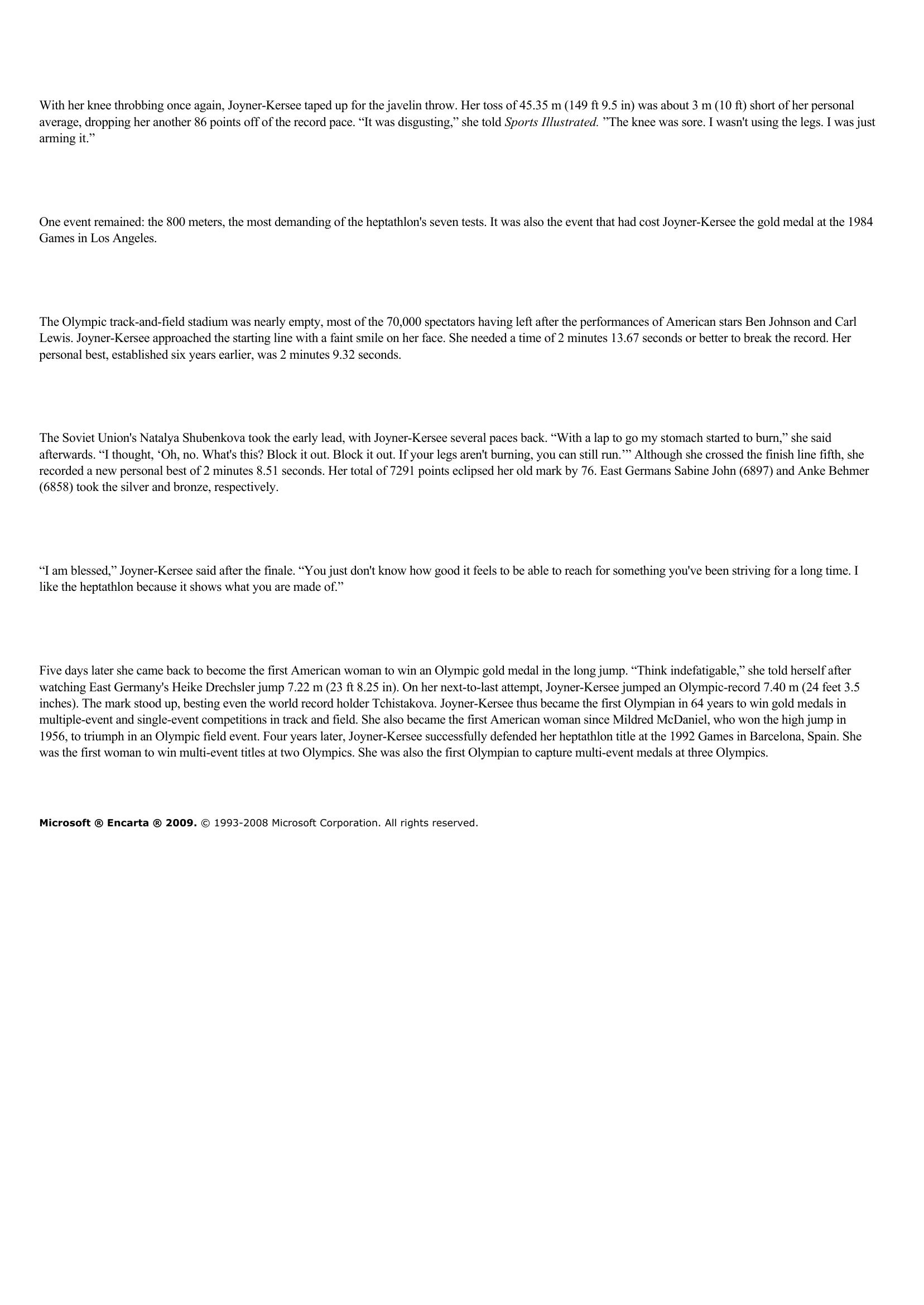Joyner-Kersee Wins Heptathlon.
Publié le 14/05/2013

Extrait du document
«
With her knee throbbing once again, Joyner-Kersee taped up for the javelin throw.
Her toss of 45.35 m (149 ft 9.5 in) was about 3 m (10 ft) short of her personalaverage, dropping her another 86 points off of the record pace.
“It was disgusting,” she told Sports Illustrated.
”The knee was sore.
I wasn't using the legs.
I was just arming it.”
One event remained: the 800 meters, the most demanding of the heptathlon's seven tests.
It was also the event that had cost Joyner-Kersee the gold medal at the 1984Games in Los Angeles.
The Olympic track-and-field stadium was nearly empty, most of the 70,000 spectators having left after the performances of American stars Ben Johnson and CarlLewis.
Joyner-Kersee approached the starting line with a faint smile on her face.
She needed a time of 2 minutes 13.67 seconds or better to break the record.
Herpersonal best, established six years earlier, was 2 minutes 9.32 seconds.
The Soviet Union's Natalya Shubenkova took the early lead, with Joyner-Kersee several paces back.
“With a lap to go my stomach started to burn,” she saidafterwards.
“I thought, ‘Oh, no.
What's this? Block it out.
Block it out.
If your legs aren't burning, you can still run.’” Although she crossed the finish line fifth, sherecorded a new personal best of 2 minutes 8.51 seconds.
Her total of 7291 points eclipsed her old mark by 76.
East Germans Sabine John (6897) and Anke Behmer(6858) took the silver and bronze, respectively.
“I am blessed,” Joyner-Kersee said after the finale.
“You just don't know how good it feels to be able to reach for something you've been striving for a long time.
Ilike the heptathlon because it shows what you are made of.”
Five days later she came back to become the first American woman to win an Olympic gold medal in the long jump.
“Think indefatigable,” she told herself afterwatching East Germany's Heike Drechsler jump 7.22 m (23 ft 8.25 in).
On her next-to-last attempt, Joyner-Kersee jumped an Olympic-record 7.40 m (24 feet 3.5inches).
The mark stood up, besting even the world record holder Tchistakova.
Joyner-Kersee thus became the first Olympian in 64 years to win gold medals inmultiple-event and single-event competitions in track and field.
She also became the first American woman since Mildred McDaniel, who won the high jump in1956, to triumph in an Olympic field event.
Four years later, Joyner-Kersee successfully defended her heptathlon title at the 1992 Games in Barcelona, Spain.
Shewas the first woman to win multi-event titles at two Olympics.
She was also the first Olympian to capture multi-event medals at three Olympics.
Microsoft ® Encarta ® 2009. © 1993-2008 Microsoft Corporation.
All rights reserved..
»
↓↓↓ APERÇU DU DOCUMENT ↓↓↓
Liens utiles
- Jackie Joyner-Kersee Jackie Joyner-Kersee, born in 1962, American track-and-field athlete, who won the heptathlon event (an all-around event) at the Olympic Games in 1988 and 1992.
- Jackie Joyner-Kersee - Sport.
- Joyner-Kersee, Jackie - sport.
- Jackie Joyner-Kersee.
- Joyner - Kersee Jackie




